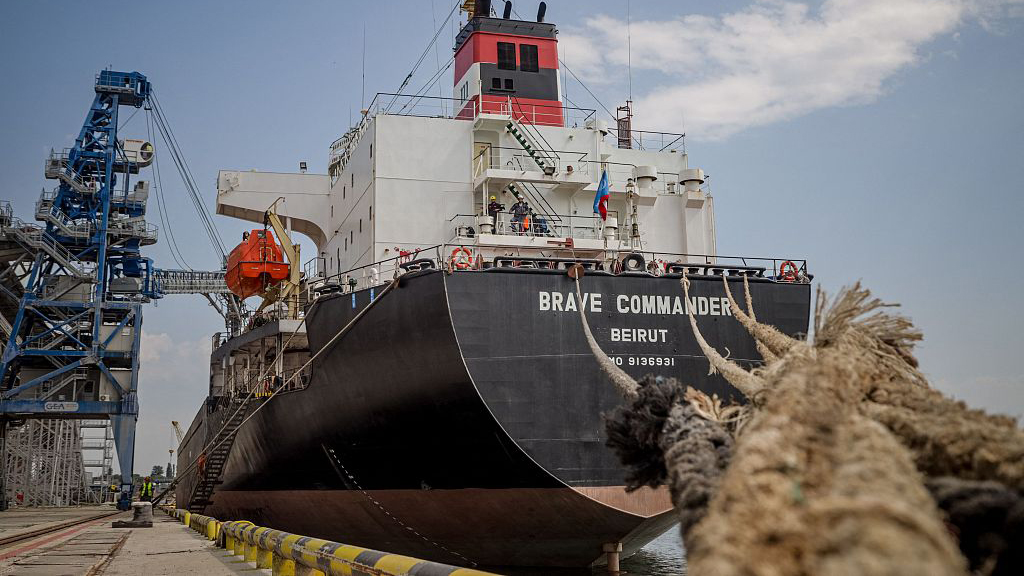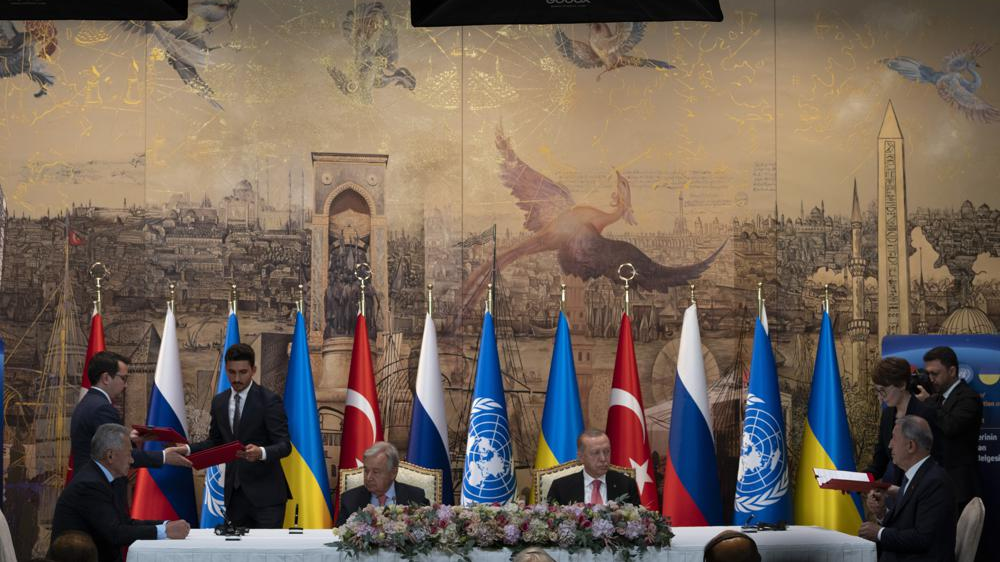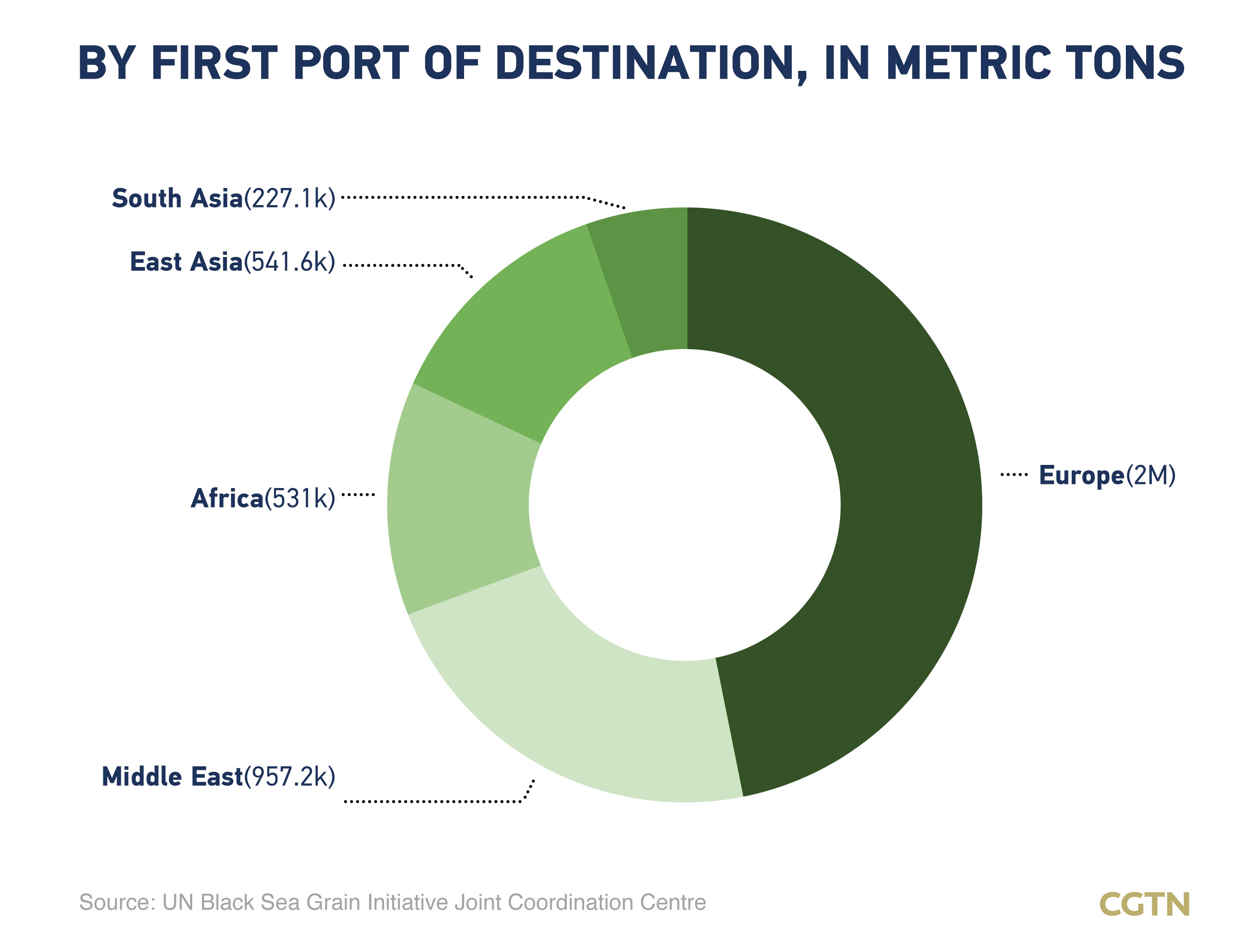01:21

At a special meeting on the sidelines of the United Nations General Assembly held in New York last week, representatives from around the world sought to draw attention to signs that the world's food supply may face even bigger challenges in the future. Besides climate change and other issues, geopolitical uncertainty was among the most frequently cited factors this year.
As one of the world's top exporters of staple grains, Ukraine normally supplies around 45 million tonnes of grain each year to countries around the globe. Yet, the Russia-Ukraine conflict that began in February has caused mountains of fresh Ukrainian harvests stacked in silos and storage facilities, leading to a shortage on the global market.
As a result, global food prices have jumped considerably, rising 12% this year alone since the start of conflict, according to data from the United Nations' Food and Agriculture Organization (FAO). Combined with soaring energy prices and dry weather in recent years, a perfect storm has pushed many developing countries to the brink of starvation, particularly those in the Middle East and Africa that were already plagued by food insecurity prior to the war.
Data from FAO shows that some of the world's most vulnerable countries are reliant on imports from Ukraine. Eritrea sourced 53% of its wheat imports from Russia while the remaining 47% came from Ukraine. Moreover, nations like Lebanon, Tunisia, Somalia and Libya all relied on Ukraine for almost half of their wheat imports.

Turkish President Recep Tayyip Erdogan and UN Secretary-General Antonio Guterres lead a signing ceremony of the Black Sea Grain Initiative at Dolmabahce Palace in Istanbul, Turkey, July 22, 2022. /Reuters
Turkish President Recep Tayyip Erdogan and UN Secretary-General Antonio Guterres lead a signing ceremony of the Black Sea Grain Initiative at Dolmabahce Palace in Istanbul, Turkey, July 22, 2022. /Reuters
In an effort to resume exports of agricultural products and reduce the war's detrimental effect on food supplies, Russia, Ukraine, Türkiye and the United Nations launched the Black Sea Grain Initiative on July 22. The joint initiative aims to provide a safe maritime passage from three Ukrainian ports in the Black Sea to the rest of the world. UN officials have lauded the initiative and credited it with lowering the global food prices.
The first vessel left Ukraine's port of Odesa on August 1, carrying more than 26,000 metric tons of corn. Since then, more than 180 ships carrying a total of 4.2 million metric tonnes have departed Ukraine's ports.
In an exclusive interview with CGTN last month, UN Secretary-General Antonio Guterres said that "the Black Sea initiative has already led to a meaningful decrease in the prices of foodstuffs all over the world."
On a visit to Ukraine's port city of Odesa, where grain exports are flowing after a near six-month standstill, Guterres cautioned that much more was needed, particularly for developing countries.
Russian President Vladimir Putin has been less enthusiastic about the deal. He pointed out that it does little in alleviating food shortages of needy nations and instead, benefits Europe overwhelmingly.
"It turns out that we have been rudely cheated, and not only us but also the poorest countries whose interests were the pretext under which all this was done," Putin said during the Eastern Economic Forum earlier this month.
During a government meeting on Tuesday, the Russian leader said Western nations are using their wealth and ability to print money to vacuum up food products from the global market. The unfolding crisis has been in the making for several years, he added. As a result, he is considering amending the deal to limit countries that can receive cargo shipments.
"Of course there are no objective reasons for revising the grain deal, not even close," Mykhailo Podolyak, an adviser to Ukrainian President Volodymyr Zelenskyy told Reuters earlier this month. "The deal, in our view and in the view of intermediaries, is being strictly observed."
"I believe that such unexpected and groundless statements rather indicate an attempt to find new aggressive talking points to influence global public opinion and, above all, put pressure on the United Nations," he said.
Since the deal was signed, Europe has received 2 million metric tonnes of agricultural goods from Ukraine – more than Africa and the Middle East combined, which received 531,000 and 957,200 metric tons respectively, according to data compiled by the Joint Coordination Centre, which has been set up to monitor the implementation of the deal.

Forty-seven percent went to high-income countries while 26 percent went to upper-middle income countries. Low and lower-middle income countries received 27 percent of total exports from Ukraine, according to the Centre.
"We do not have the authority to say this ship goes first, this ship goes second. This is about clearing harbors. This is about commercial transactions," said Stéphane Dujarric, spokesperson for the UN Secretary-General.
"I think what is important is that the fact that we are now seeing more grains going onto the global market than we were in the beginning of the war."
Moscow's potential withdrawal from the deal could deprive Ukraine of a major part of its hard-currency revenues, and will drive up global food prices again. Moreover, it could drive up despite current uncertainties surrounding the fate of the deal, there have been signs that things are turning for the better.
Morgan Stanley forecast in July that food prices are likely to peak this year and start falling in 2023 due to a variety of factors including increased output by farmers, weather normalization and potential for easing of tensions between Russia and Ukraine.
(Video by Yang Yiren)

